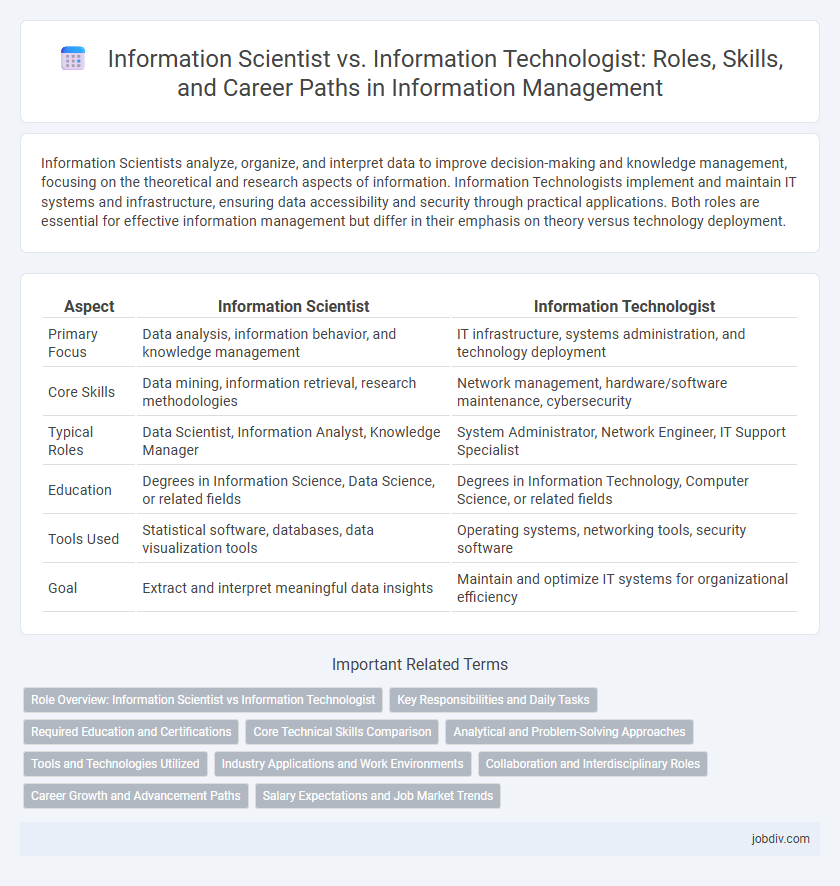Information Scientists analyze, organize, and interpret data to improve decision-making and knowledge management, focusing on the theoretical and research aspects of information. Information Technologists implement and maintain IT systems and infrastructure, ensuring data accessibility and security through practical applications. Both roles are essential for effective information management but differ in their emphasis on theory versus technology deployment.
Table of Comparison
| Aspect | Information Scientist | Information Technologist |
|---|---|---|
| Primary Focus | Data analysis, information behavior, and knowledge management | IT infrastructure, systems administration, and technology deployment |
| Core Skills | Data mining, information retrieval, research methodologies | Network management, hardware/software maintenance, cybersecurity |
| Typical Roles | Data Scientist, Information Analyst, Knowledge Manager | System Administrator, Network Engineer, IT Support Specialist |
| Education | Degrees in Information Science, Data Science, or related fields | Degrees in Information Technology, Computer Science, or related fields |
| Tools Used | Statistical software, databases, data visualization tools | Operating systems, networking tools, security software |
| Goal | Extract and interpret meaningful data insights | Maintain and optimize IT systems for organizational efficiency |
Role Overview: Information Scientist vs Information Technologist
Information Scientists specialize in analyzing, managing, and interpreting complex data to drive decision-making and innovation across various industries. Information Technologists focus on designing, implementing, and maintaining computer systems and networks to support organizational IT infrastructure. The primary distinction lies in Information Scientists prioritizing data insights and research, while Information Technologists emphasize technology deployment and system functionality.
Key Responsibilities and Daily Tasks
Information Scientists analyze and organize data to improve information retrieval, focusing on data modeling, knowledge management, and research methodologies. Information Technologists manage and maintain IT infrastructure, ensuring system security, network administration, and software implementation. Both roles collaborate on data quality but differ in their emphasis on data analysis versus technology deployment.
Required Education and Certifications
An Information Scientist typically requires an advanced degree such as a master's or PhD in information science, data science, or a related field, emphasizing research and analysis skills. Certifications like Certified Information Professional (CIP) or data analytics credentials enhance their expertise. In contrast, an Information Technologist usually holds a bachelor's degree in computer science, information technology, or engineering, with certifications such as CompTIA A+, Cisco Certified Network Associate (CCNA), or Microsoft Certified Solutions Expert (MCSE) to validate technical proficiency.
Core Technical Skills Comparison
Information scientists excel in data analysis, machine learning, and information retrieval, leveraging advanced algorithms and statistical methods to interpret complex datasets. Information technologists specialize in network administration, systems architecture, and cybersecurity, focusing on maintaining and optimizing IT infrastructure. Both roles require proficiency in programming languages such as Python and SQL, but their core technical skills diverge based on data-centric versus system-centric responsibilities.
Analytical and Problem-Solving Approaches
Information Scientists prioritize data analysis and conceptual modeling to extract meaningful insights and develop information systems tailored to user needs. Information Technologists focus on implementing and maintaining technology solutions, using troubleshooting and system optimization techniques to address technical challenges efficiently. Both roles require strong analytical thinking, but Information Scientists emphasize theoretical problem-solving while Information Technologists concentrate on practical, technology-driven solutions.
Tools and Technologies Utilized
Information Scientists primarily utilize advanced data analysis tools, machine learning algorithms, and statistical software to extract meaningful insights from complex datasets. Information Technologists focus on deploying and managing IT infrastructure, including networks, databases, cloud computing platforms, and cybersecurity solutions. Both roles leverage programming languages, but Information Scientists emphasize data mining and visualization tools, whereas Information Technologists prioritize system administration and integration technologies.
Industry Applications and Work Environments
Information Scientists primarily focus on analyzing, organizing, and interpreting data to improve decision-making processes across industries such as healthcare, finance, and marketing. Information Technologists specialize in implementing and managing information systems, networks, and security protocols within IT departments of sectors like telecommunications, government, and retail. Both professions operate in dynamic environments demanding collaboration with cross-functional teams to enhance technological solutions and optimize data utility.
Collaboration and Interdisciplinary Roles
Information Scientists analyze data structures and user needs to optimize knowledge systems, collaborating closely with Information Technologists who design, implement, and maintain the underlying technological infrastructure. Their interdisciplinary roles require seamless integration of data analytics, system development, and user experience to drive effective information management solutions. This collaboration enhances innovation by bridging theoretical insights with practical technology applications across diverse sectors.
Career Growth and Advancement Paths
Information Scientists specialize in analyzing and interpreting complex data to improve decision-making processes, often advancing into roles such as data architect or chief data officer. Information Technologists focus on designing, implementing, and managing IT systems, with career growth leading to positions like IT manager or chief technology officer. Both career paths offer advancement opportunities influenced by expertise in data analytics, system integration, and emerging technologies such as artificial intelligence and cybersecurity.
Salary Expectations and Job Market Trends
Information Scientists typically command higher salaries, with averages ranging from $90,000 to $130,000 annually, reflecting their advanced analytical and data management skills. Information Technologists earn between $70,000 and $110,000, driven by demand for technical expertise in system implementation and maintenance. Job market trends indicate growing opportunities for both roles, but Information Scientists benefit from increasing reliance on data-driven decision-making in industries like healthcare and finance.
Information Scientist vs Information Technologist Infographic

 jobdiv.com
jobdiv.com